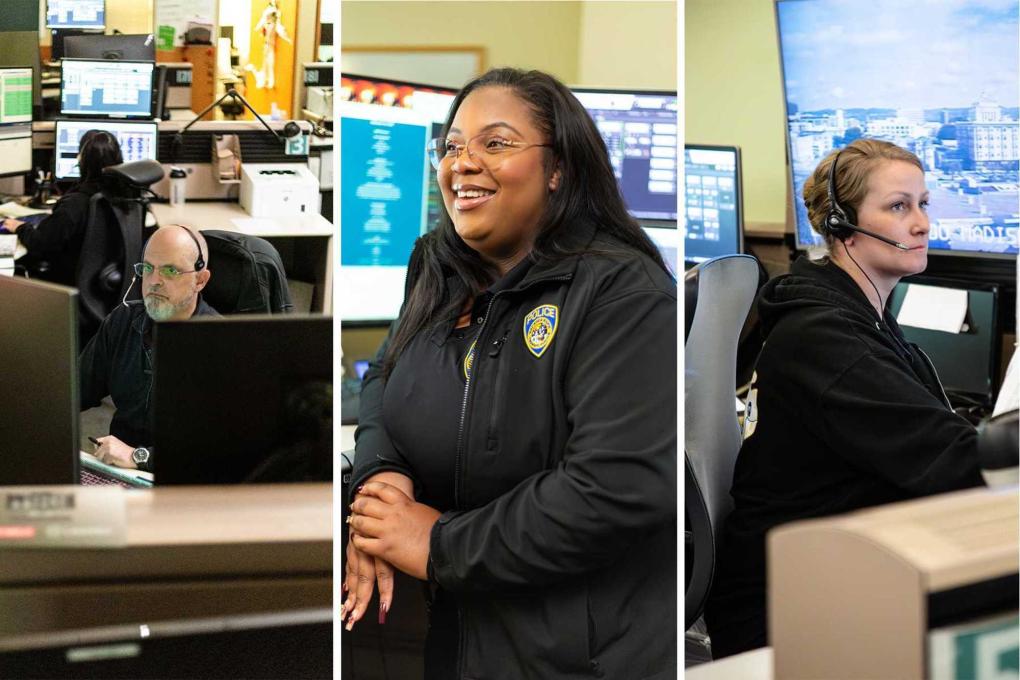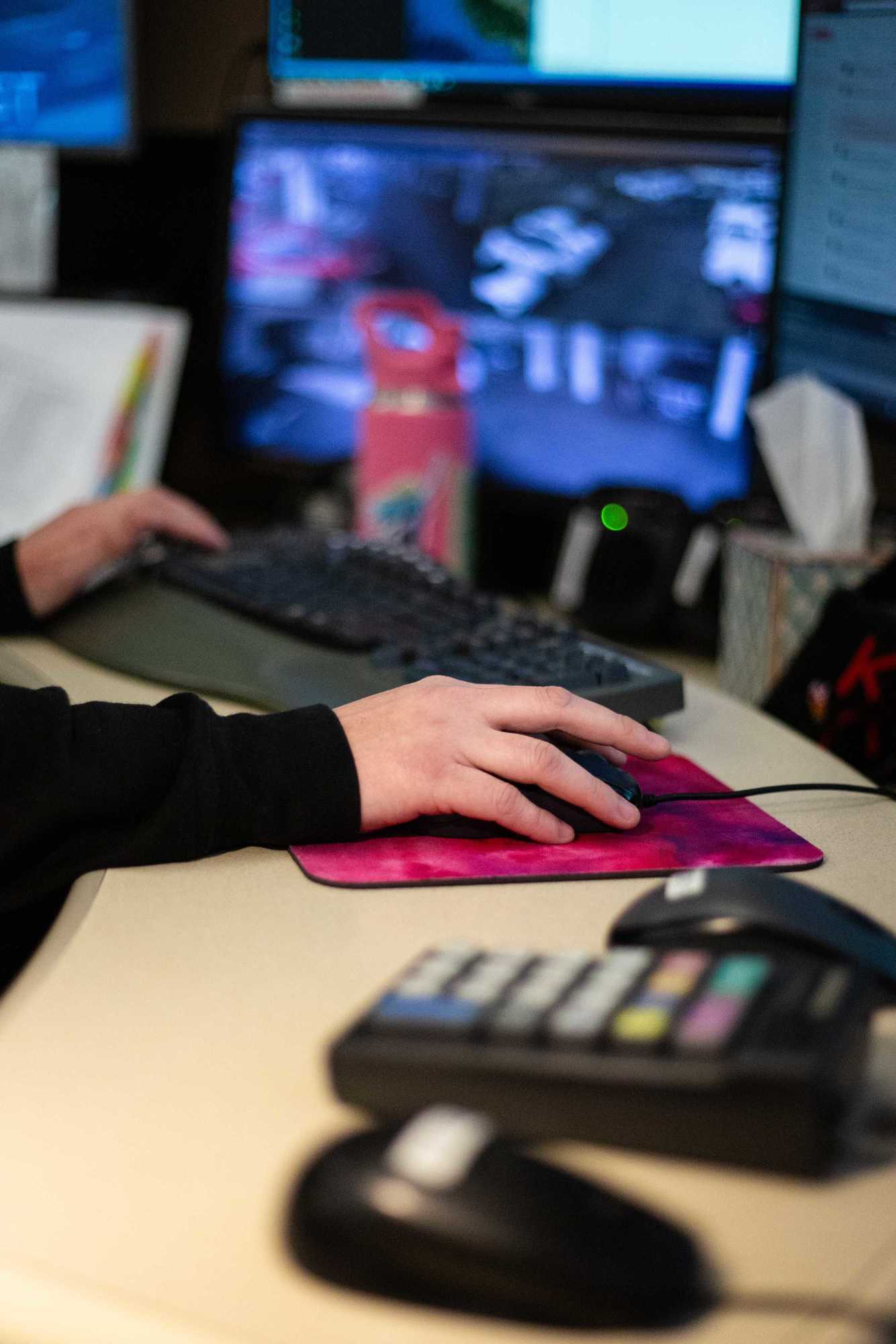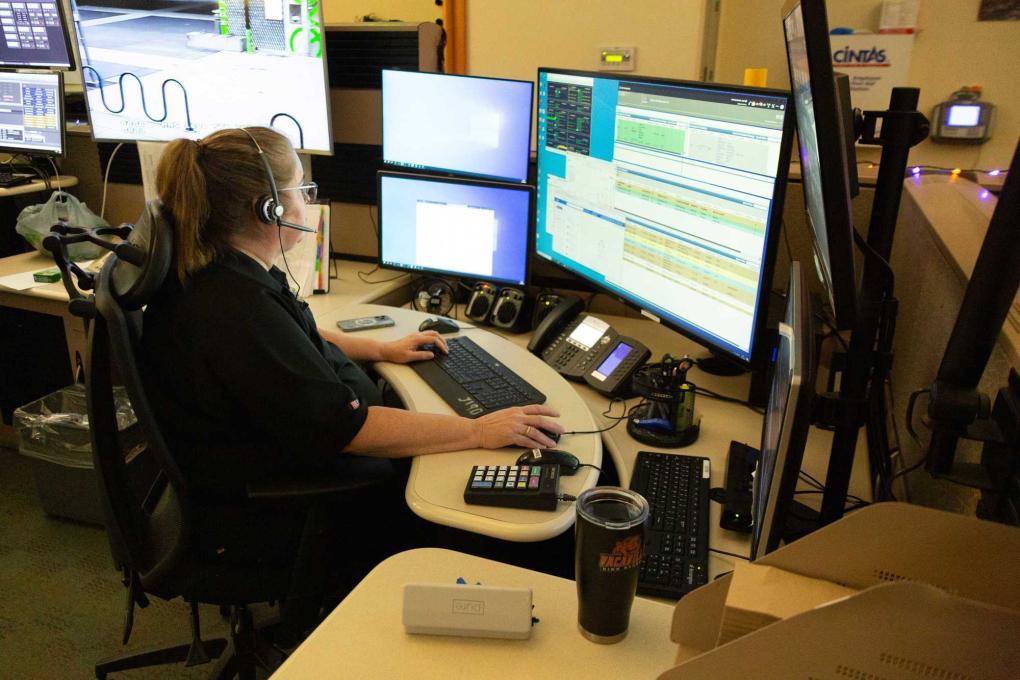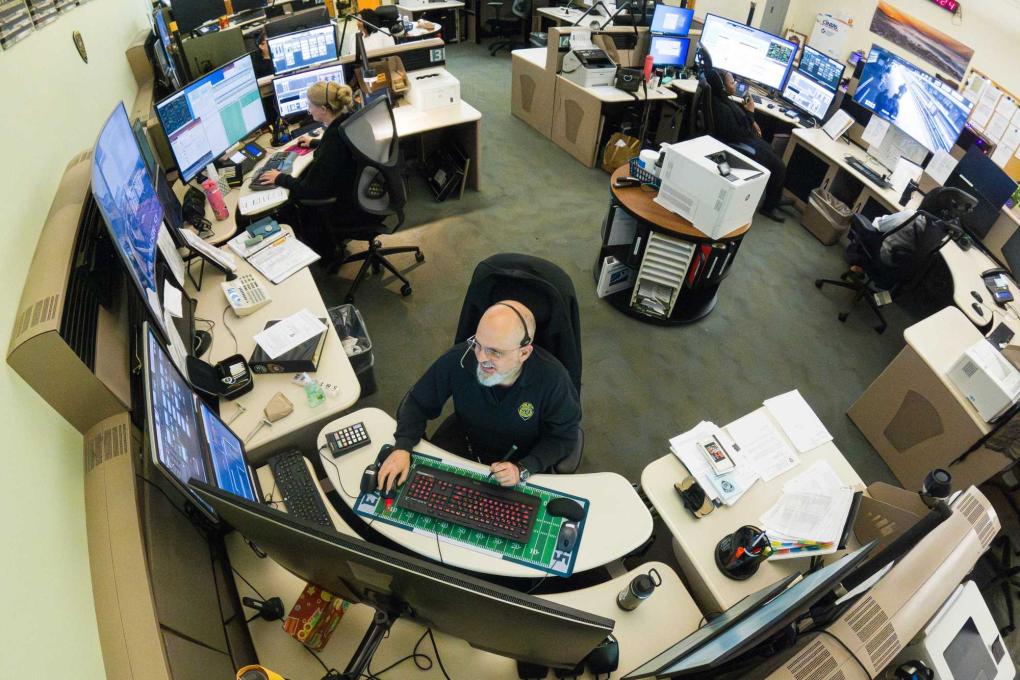Dispatchers are the “behind-the-scenes heroes” of BART Police

BART is currently hiring entry-level and lateral dispatchers. Salaries start at $81,000 - $99,000 annually, and BART Police is offering a $15,000 hiring incentive. The role include premier benefits, including enrollment in the CalPERS pension retirement program. To be considered, applicants must possess a high school diploma, GED, or recognized equivalent.
For more information, download the recruitment flyer and visit joinbartpd.com/police-dispatcher.
(Pictured above: Dispatchers Robert Lowell, Taylor Fulmore, and Kasey Frost at work.)
You won’t hear a phone ring for long in the BART Police Dispatch Center.
“We answer the phone after two or three rings almost always,” said BART Police Dispatcher Taylor Fulmore. “You are going to get a real human on the phone very quickly."
BART Police has one of the fastest response times in the nation for major incidents, averaging 4 minutes and 25 seconds for Priority-One emergencies. BART’s skilled dispatchers play an essential role in makin g that rapid response happen.
g that rapid response happen.
“We’re like orchestra conductors,” said Senior Dispatcher Robert Lowell, who’s worked BART dispatch for 21 years. “You’re telling the officer units where to go, when, and why. We’re the gateway that makes the department flow.”
When you consider jobs at a police department, you probably think of the obvious one: police officer. But there are a multitude of non-sworn, civilian roles that are crucial to the functioning of a well-oiled police department.
Dispatchers are the first conduit in a network of fast actions triggered by a 911 call. They’re staffing the phones 24 hours a day to connect those who may be witnessing or experiencing a crime with safety services. And they do it with impressive speed and dexterity.
“Staffing the phones” is a bit misleading. Dispatchers don’t simply answer calls; they’re also responding to texts from the non-emergency line and fielding messages from the BART Watch App. That’s not all. At any given moment, a dispatcher will have upwards of 10 computer tabs and programs open, each with a different but important purpose. They’re scanning camera feeds, analyzing a real-time map of every train in the system, and managing a program that collates active calls and available units. Each dispatcher’s desk has five monitors, three mice, two keyboards (one for the computer, one for the phone), and a foot pedal for the dispatch radio so they can call for units while typing information.

Communications Supervisor Patty McPeak pictured at her desk. McPeak has worked for BART for 29 years.
“Dispatchers have to multitask and must possess a lot of common sense,” said Communications Supervisor Patty McPeak, who’s been with BART for 29 years. “We need people with street smarts, not just book smarts. You have to use your entire brain in this job and juggle multiple things at once.”
The work of dispatchers intersects with multiple expertise: law enforcement, customer service, public health and social services, and even some behavioral psychology.
“We’re all really good at anticipating what suspects will do,” Dispatcher Fulmore said. “For example, if we get a call that someone just had a phone stolen on the concourse, we know the suspect will run to the platform to get on a train, so we stop the next train from entering the station. We have a lot of techniques to set officers up for success.”
Dispatchers do detective work, too, added Dispatcher Stacie Richardson, an 18-year veteran of the department who was essential in the arrest of Nia Wilson's convicted killer in 2018.
“I remember that day well,” she said. “I got a call from a guy, saying, ‘Hey, I got off the train at Fruitvale five minutes ago, and I think I saw the suspect onboard. It was going toward downtown Oakland.’” It wasn’t much info to work with, but his description of the suspect matched the warrant, so Dispatcher Richardson leapt into investigative mode.
“There were so many trains running at that time, but based off that little bit of info, I was able to track the right one down,” Dispatcher Richardson said. “I found the suspect on the security camera feed and was pretty certain it was him. I followed him on the cameras until he disembarked at MacArthur Station to board a Pittsburg-bound train. I held that train, alerted the nearest police unit, and within minutes, they arrested him.”
"Getting the guy doesn’t make it any easier for the family,” Dispatcher Richardson added. “But I know it gave them a sense of relief.”
(Note: To get help as fast as possible on a train, it’s important to take note of the car number, which tells dispatchers exactly what train you are on and where it is going. The car number is located above the doors on the inside of each end of the train car.)

Dispatcher Robert Lowell smiles at his desk. Lowell has been deemed the team DJ.
Every BART dispatcher works the police radio channel for a few hours a shift. On the radio, they have the responsibility of prioritizing calls and dispatching units in a timely fashion, all while taking into account the availability of officers.
“Dispatchers are often coordinating train holds, assigning calls to units on the field, relaying real-time updates, and gathering information,” said Communications Supervisor Sabrina Castro. “The radio dispatcher is often interacting with Officers, Ambassadors, Crisis Intervention Specialists, Community Service Officers, Fare Inspectors, Amtrak Officers, Detectives, Deputy Chiefs, and Watch Commanders at any given time.”
Said Dispatcher Fulmore, “We can stop someone’s commute with just four numbers on a keyboard, so prioritization is critical.” Dispatchers don’t want to hold a train unless they absolutely must.
Dispatcher Fulmore said she never imagined she’d be working in a police department. She studied communications in college and figured she’d work in media.
“I’m still using that communications knowledge, just in a different way,” she said. “We need people from a variety of personal and professional backgrounds to accomplish what we’re trying to do in the dispatch center. There are very few jobs you can come into at the entry level.”
Dispatcher Patsy Hernandez said her previous career as a dental assistant helped prepare her for the job.
“In the dental office, I learned customer service, how to deal with different types of people, how to problem solve,” she said. “All of those skills prepared me for this work."
Newly hired dispatchers receive thorough training that lasts around a year. Training starts in the classroom followed by a three-week academy course for general policing knowledge, geography training in the field, phone training, and lastly, radio training. Those who are already familiar with BART tend to finish training earlier. You must know the BART map inside and out, how the railway operates, and understand the complex dance of trains moving through the system.
You might think the BART Police Dispatch Center is full of people shouting into phones and rushing to and fro. To the contrary, the room is dimly lit and peaceful – calmer than many open-floor offices. A mini waterfall bubbles peacefully in supervisor McPeak’s and Castro’s office against a sonic backdrop of clacking keys, low voices, and sometimes cackles as the dispatch partners lob jokes at each other across the room.
Dispatcher Lowell has been deemed the team DJ. During his shift, he spins his favorite tunes for the group – some Rolling Stones here, some Eric Burdon and the Animals there. He said it helps keep the good energy flowing and builds camaraderie.
With some training, dispatchers learn to let tough calls go, to talk them out with their partners, and to reach out to the peer support team when they need extra support. And supervisors Castro and McPeak are always looking for stress management techniques for their team; around Halloween, for example, they hosted a coloring contest with a $50 gift card for the best work.
“We decorate for the holidays, throw lots of baby showers, and you’ll find balloons all over the place for birthdays,” said Dispatcher Fulmore. “We’ve made this place a home.”
That’s part of the reason BART’s dispatch team has low turnover. Nearly half the team has worked at BART for more than twenty years. The most senior dispatcher, Evelyn Hammer, has 31 years at BART under her belt.
“We stay here,” said Dispatcher Richardson. “You look forward to your shift. It doesn’t feel like work a lot of the time, though it is definitely work.”
"But it’s meaningful work,” Dispatcher Fulmore added. “We’re part of the culture of community care in the Bay Area. We’re behind-the-scenes heroes.”